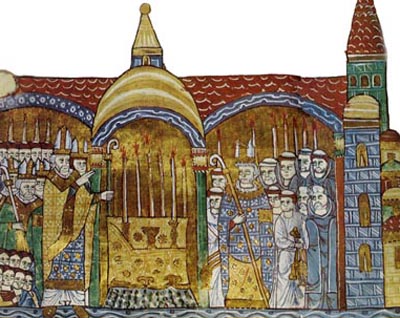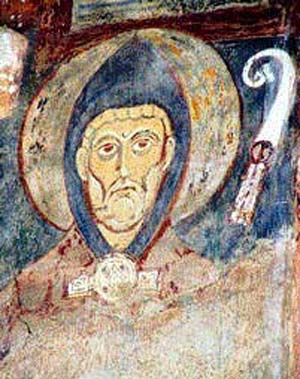 |
The Saint of the Day
St. Mayeul, May 11
Prof. Plinio Corrêa de Oliveira
Biographical selection:
St. Mayeul of Cluny [also known as Majolus] was born in Avignon, France in 906. He became a canon of Mâcon. To escape being named Bishop of Besançon he became a monk at Cluny. In 965 he was elected Abbot and governed over Cluny for almost 50 years. The trust he inspired in Popes and Princes created the opportunity for him to exert a great influence on his time, and he reformed a great number of monasteries.

The Abbot of Cluny, at right, meets
important religious dignitaries, who bless him
|
In 973, Abbot Mayeul was returning home after a visit in Rome, accompanied by a large group of men from other countries who felt more secure traveling in the company of the saint. On their passage through the Alps, they were attacked by the Saracens of Freysinet, who took them captive and enchained them. Greatly afflicted, the holy Abbot prayed to God that none of his company would be killed, and his prayers were heard.
On one occasion, some of the Moors who were holding the captives began to mock the Catholic Religion. St. Mayeul made a strong response, showing the truth of our Faith and the falsity of theirs. Irritated by this, they closed up the saint in a deep cave.
In it he found a book, Treatise of the Assumption of the Holy Virgin, attributed to St. Jerome. He asked the Virgin Mary that he might be free to celebrate the feast day of the Assumption among Catholics. After making his prayer, he miraculously found himself free of his chains. The Arabs, stupefied, began to treat him with respect. He also wrote to Cluny asking them to send his ransom fee and that of his companions. During the time awaiting the response, the Arabs prepared special bread for him, since he would not partake of theirs.
Once a Saracen stepped on St. Mayeul’s Bible, and was reprehended by his companions. That day the same man got into a fight with another Arab, and in it he lost the very foot that he had used to step on the Holy Book.
When the ransom money arrived, he was freed and was able to celebrate a Mass on the Feast of the Assumption, just as he had asked. Not long after his release, the Saracens of Freysinet were defeated by Catholic troops. This was considered a divine punishment for having imprisoned the holy Abbot.
Comments of Prof. Plinio:
One can see how God in a marvelous way gives different graces that correspond to different souls and their calls to sanctity. This episode from the life of St. Mayeul shows how God tested the confidence of the companions of the Abbot of Cluny. They had the good idea to ask to travel with the saint because they felt more secure from danger with him in their midst than by themselves. Instead of finding safety, however, they were captured by the Saracens and put in chains. It could appear that God had fooled them. But this is not true. Let us analyze what happened in reality, beneath the surface.
First, they heard the saint asking that their lives be spared, and saw that God listened to his prayer. Not one of them died or was killed. Therefore, they were not disappointed in their primary hope to preserve their lives.
Second, not only was their confidence justified by the preservation of their lives, but they received much more than they had asked for. They were able to share the day-to-day life with St. Mayeul, which was a great grace.
There is a maxim that says: what the devil promises a man, he ends by taking. God is the opposite. He returns to the person the very thing He seems to take from him. When He seems to be taking something, He is more often just testing the confidence of His children. This is evident in this incident from the life of St. Mayeul. To all appearances He deprived the travelers of their liberty. But in reality He gave them the opportunity to witness a series of miracles that did an enormous good for their souls.

St. Mayeul, Chapelle de Berzé-la-Ville, France
|
They saw the saint dispute with the Saracens and were thus given the opportunity to realize the glory of the Catholic Religion, since the Moors were unable to reply to his arguments. This is why they became irritated and imprisoned St. Mayeul.
They could also witness the saint finding the book about Our Lady, making his request, and her eventual response with his liberation. They also saw the chains of the saint miraculously break, so that he was freed and able to walk out of the deep cave. They saw the stupefaction of the Moors at seeing this miracle and how they started to treat him better. They also saw that the Arab who stepped on the Abbot’s Bible lost that foot on the same day, and they understood the divine intervention punishing the bad man.
They could also measure the extent of human evil – even after the Saracens had seen all these things and received these graces, they did not convert. Finally, they could consider the divine chastisement that fell on those same Saracens who were defeated in battle some time later. You can see, therefore, that Divine Providence gave those travelers abundantly more than what they were expecting.
The lesson is that we should confide in Providence. Sometimes Divine Providence asks a blind confidence from us. It is a kind of confidence that trusts against all appearances and remains faithful despite appearances to the contrary. If we make it a habit to practice this heroic confidence, we accumulate for ourselves a great treasure of mercy.
Let us say, for example, that someone founds a school. After a certain period of time, the school fails. He thinks: God abandoned me. Another individual tries to convert certain persons and is not successful. Still another tries to establish a movement for the glory of Our Lady, and the movement does not go forward. They can all be tempted to think: God abandoned me. It is not true. Very often God gives the success by means of many apparent abandonments. We have to walk through many real catastrophes and at the end we will harvest the victory. By the good acceptance of all these intermediary catastrophes, we merit in the end the thing we had hoped for.
Sometimes it is very hard to understand what is happening, what is the plan of Our Lady for us. But if we confide against all appearances, we will receive more than what we have asked for. This is what happened with the men who accompanied the saint.
Then, let us ask St. Mayeul for the grace to see this represented in our own lives and to understand how the hand of God is guiding us through the perplexing tunnels and catastrophes we face; how the care and love of Our Lady is ever with us, preparing us to receive more than what we have asked for.


  | | Prof. Plinio Corrêa de Oliveira | |
The Saint of the Day features highlights from the lives of saints based on comments made by the late Prof. Plinio Corrêa de Oliveira. Following the example of St. John Bosco who used to make similar talks for the boys of his College, each evening it was Prof. Plinio’s custom to make a short commentary on the lives of the next day’s saint in a meeting for youth in order to encourage them in the practice of virtue and love for the Catholic Church. TIA thought that its readers could profit from these valuable commentaries.
The texts of both the biographical data and the comments come from personal notes taken by Atila S. Guimarães from 1964 to 1995. Given the fact that the source is a personal notebook, it is possible that at times the biographic notes transcribed here will not rigorously follow the original text read by Prof. Plinio. The commentaries have also been adapted and translated for TIA’s site.
|
Saint of the Day | Home | Books | CDs | Search | Contact Us | Donate

© 2002- Tradition in Action, Inc. All Rights Reserved
|
 |
|